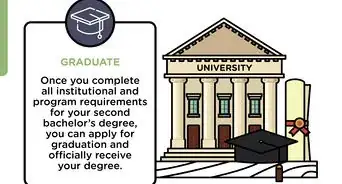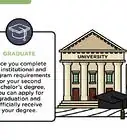wikiHow is a “wiki,” similar to Wikipedia, which means that many of our articles are co-written by multiple authors. To create this article, 30 people, some anonymous, worked to edit and improve it over time.
This article has been viewed 236,645 times.
Learn more...
Choosing a university course is a big decision. Although some people seem confident they know what they want to do, it's okay to be unsure about what your chosen career path will be. With a little research and introspection you can choose a course that will make you happy.
Steps
-
1Decide what interests you. List the fields of study that interest you, and come up with a list of courses you would consider studying based on these interests. Add the topics that you were most interested in during school as well as jobs that you envied others for.[1]
-
2Do your research. The internet, newspapers, television and people around you are the best sources of information. Check online about the courses you are interested in and find out about the career prospects and the other information. Speak to people who are in your interested profession and find out what it is to choose your future career. People who have completed university courses can give you an insight from a student’s perspective - they can tell you the pros and cons.[2]Advertisement
-
3Check out the course content. To avoid making mistakes, make sure you review the course outline of the course(s) you want to apply for. Have a look at the subjects you must undertake and the types of learning, assignments and examination tasks involved. This will enable you to form a rough idea of what lies ahead for you.[3]
-
4Examine the university quality. If you are set on going to a particular university, don’t let this completely dictate your course selection. Compare course outlines and studying facilities between universities to make sure you make the right choice for your educational needs and preferences. If possible, visit the university and attend some of the lectures to get a feeling of what some of the subjects will be like.[4]
-
5Decide on your course duration. To be certain that you will be committed to your studies, find out the duration of your course. Taking double-degrees, full time or part-time depends on your personal choice. Ensure that you will be able to balance your other priorities along with education. Study flexibility varies amongst universities.[5]
-
6Find out the entry requirements. It is more difficult to get accepted in to competitive courses, especially those which are in high demand. This is a good measure of whether you are actually capable of doing well in the course or not. Unfortunately, some courses are too hard to get in to, or just too hard to actually succeed in completing, so be honest with your course selection. You should research other universities or similar courses if you are not confident in being accepted into your first preference course.[6]
-
7Be certain about the cost of study. Affordability is another aspect you need to consider while deciding on your course, as well as the additional costs that occur, such as text books, field trips etc. However, do not let cost hamper your career choice, as there are a number of financial assistance options available to complete the course.
-
8Look for post-study career opportunities. Look at the career prospects of the course before selecting one. Consider various factors such as income, job security, stress, responsibility and other benefits while researching a profession. It is also useful to find out if a future employer will invest in your education.
Community Q&A
-
QuestionWhat should I study if I like architecture but am good at medicine, too?
 Community AnswerIt's up to you. You can be good at any number of things, but for your studies, you should choose either what interests you most or what will help you toward the career you want. Think realistically about whether you have enough relevant skill and passion to have a real shot at a career in architecture. If yes, you can go ahead and pursue that. If not, it might be better to pursue something with more reliable career opportunities, like medicine.
Community AnswerIt's up to you. You can be good at any number of things, but for your studies, you should choose either what interests you most or what will help you toward the career you want. Think realistically about whether you have enough relevant skill and passion to have a real shot at a career in architecture. If yes, you can go ahead and pursue that. If not, it might be better to pursue something with more reliable career opportunities, like medicine. -
QuestionHow do I discover my interests?
 Community AnswerBy taking part in many different activities. The ones you like are part of your interests. To find your interests, you just have to go out and discover new things.
Community AnswerBy taking part in many different activities. The ones you like are part of your interests. To find your interests, you just have to go out and discover new things. -
QuestionWhat courses can I pick for college?
 Community AnswerThere are many course options. The course options depend on what school you plan to attend. The course needs of an individual student also vary. A student pursuing a business degree will take different courses than one studying computer science. In general, all students will need some common, general education courses. These include basic courses in writing, science, math, and social studies.
Community AnswerThere are many course options. The course options depend on what school you plan to attend. The course needs of an individual student also vary. A student pursuing a business degree will take different courses than one studying computer science. In general, all students will need some common, general education courses. These include basic courses in writing, science, math, and social studies.
Warnings
- Never choose a course because everyone is going for it or because your friends and family are pressurizing you to take it.⧼thumbs_response⧽
References
- ↑ https://www.ncbi.nlm.nih.gov/pmc/articles/PMC5839644/
- ↑ https://mcm.edu.ph/the-importance-of-choosing-the-right-senior-high-school-track-or-strands/
- ↑ https://www.nidirect.gov.uk/articles/choosing-right-course-university-or-college
- ↑ https://www.sciencedirect.com/science/article/abs/pii/S1441358209000950
- ↑ https://www.cmu.edu/teaching/designteach/design/contentschedule.html
- ↑ https://study.unimelb.edu.au/find/courses/graduate/doctor-of-medicine/entry-requirements/
About This Article
To choose the right course, do a Google search on your possible career path to learn what education you will need and what the average salary is. Consider which courses you will enjoy as well as which courses will provide you with applicable skills in the job field. Before making a selection, review the course content online to learn how many credits you will need and how long the program will take. To learn more about university costs and entrance requirements, keep reading.
























































